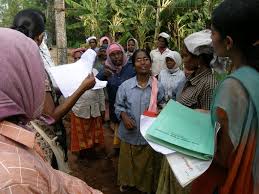Ahmedabad
(Head Office)Address : 506, 3rd EYE THREE (III), Opp. Induben Khakhrawala, Girish Cold Drink Cross Road, CG Road, Navrangpura, Ahmedabad, 380009.
Mobile : 8469231587 / 9586028957
Telephone : 079-40098991
E-mail: dics.upsc@gmail.com

Social Audit
News: Recently, Social Audit Units under NREGA are in dismal state according to a newspaper report by The Hindu.
What is Social Audit?
• Social Audit is the audit of a scheme jointly by the Government and the people, especially by those who are affected by the scheme or its beneficiary.
• Social audit is different from financial audits which involve inspecting and assessing documents related to financial transactions in an organization to provide a true picture of its profits, losses and financial stability.
What are Social Audit Units (SAU)?
• The social audit unit’s sole responsibility is to flag cases of malpractice, following which recovering misappropriated money – and reprimanding the officials responsible – is the job of the state government.
• The SAUs are suffering because they are fund-starved and do not have trained or adequate personnel working for them.
• Data from the Union rural development ministry for the ongoing financial year shows that less than 14% of the amount flagged by auditors has been recovered so far. While the social audit units flagged misappropriation of Rs 27.5 crore, the amount came down to Rs 9.5 crore after action was taken in some cases. But so far, only Rs 1.31 crore (13.8%) has been recovered so far.
Social Audit and MGNREGA:
• Under Section 17 of the MGNREGA, all works executed under the program must undergo a social audit. Every Social Audit Unit is entitled to funds equivalent to 0.5% of the MNREGA expenditure incurred by the State in the previous year.
Importance of Social audit:
• Improved governance: Social auditing impact governance leading to good governance.
• Accountability and transparency: It allows the voice of stakeholders, including marginalized/poor groups being heard by the authorities. Social auditing enhances local governance, and strengthen accountability and transparency in local bodies.
• Enhance development: It help in assessing the physical and financial gaps between needs and resources available for local development. It brings efficiency and effectiveness of local development programmes.
• Reduces corruption: It uncovers irregularities and malpractices in the public sector and maintains oversight on government functioning, thus reducing leakages and corruption.
• Local participation – Having citizens involved in Social Audits promotes local participation in governance process.
• It saves government resources by addressing loopholes, eliminating corruption and also saves public’s money.
Challenges:
• Rules not followed: In several states, Gram Panchayats are not required to provide Social Audit Units with records pertaining to work completion and expenditures, and Gram Sabhas are not provided with social audit reports in their native languages.
• Lack of Independency: Many governments do not adhere to the transparent selection procedure for the director of the Social Audit Units as specified in the requirements. Several Social Audit Units do not have enough personnel to cover all of the panchayats even once a year.
• Not Institutionalised: Auditors are subject to implementing agencies that face resistance and intimidation and struggle to even get access to original data for verification because the government has not regulated the institutionalisation of Social Audit.
• Little or no incentives to participate in Social audit programmes for individuals.
• Lack of Standardization - Unlike financial reporting, there is no universal standard for social audits.
• Lack of Awareness and Education - Some organizations and stakeholders might not fully understand the concept of social audits and their benefits. This lack of awareness can hinder the successful implementation of the audit.
Social Audit in India:
• Meghalaya was the first state in India to implement the Meghalaya Community Participation and Public Services Social Audit Act, 2017. Thus, they made Social Audit mandatory by law.
• Andhra Pradesh - In Andhra Pradesh, the Society for Social Audit, Accountability and Transparency was established as an independent organization free from intervention from the government. In terms of implementing SA, the state of Andhra Pradesh has emerged as a model for all other states.
Conclusion
• Despite the challenges, benefits of conducting social audits outweigh the difficulties. Addressing these challenges requires careful planning, clear communication, stakeholder engagement, and a genuine commitment to improvement.

Address : 506, 3rd EYE THREE (III), Opp. Induben Khakhrawala, Girish Cold Drink Cross Road, CG Road, Navrangpura, Ahmedabad, 380009.
Mobile : 8469231587 / 9586028957
Telephone : 079-40098991
E-mail: dics.upsc@gmail.com
Address: A-306, The Landmark, Urjanagar-1, Opp. Spicy Street, Kudasan – Por Road, Kudasan, Gandhinagar – 382421
Mobile : 9723832444 / 9723932444
E-mail: dics.gnagar@gmail.com
Address: 2nd Floor, 9 Shivali Society, L&T Circle, opp. Ratri Bazar, Karelibaugh, Vadodara, 390018
Mobile : 9725692037 / 9725692054
E-mail: dics.vadodara@gmail.com
Address: 403, Raj Victoria, Opp. Pal Walkway, Near Galaxy Circle, Pal, Surat-394510
Mobile : 8401031583 / 8401031587
E-mail: dics.surat@gmail.com
Address: 303,305 K 158 Complex Above Magson, Sindhubhavan Road Ahmedabad-380059
Mobile : 9974751177 / 8469231587
E-mail: dicssbr@gmail.com
Address: 57/17, 2nd Floor, Old Rajinder Nagar Market, Bada Bazaar Marg, Delhi-60
Mobile : 9104830862 / 9104830865
E-mail: dics.newdelhi@gmail.com